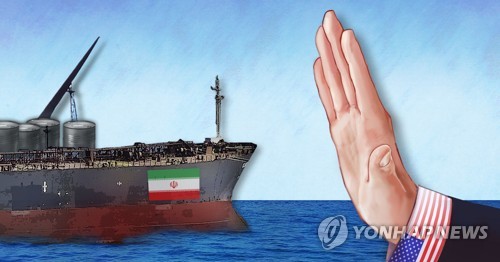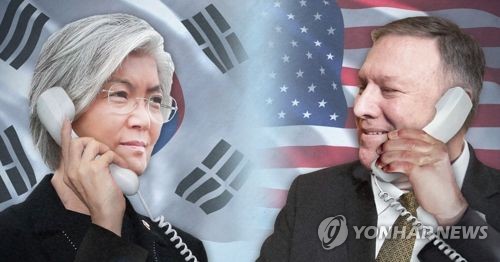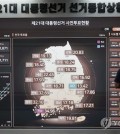- California Assembly OKs highest minimum wage in nation
- S. Korea unveils first graphic cigarette warnings
- US joins with South Korea, Japan in bid to deter North Korea
- LPGA golfer Chun In-gee finally back in action
- S. Korea won’t be top seed in final World Cup qualification round
- US men’s soccer misses 2nd straight Olympics
- US back on track in qualifying with 4-0 win over Guatemala
- High-intensity workout injuries spawn cottage industry
- CDC expands range of Zika mosquitoes into parts of Northeast
- Who knew? ‘The Walking Dead’ is helping families connect
S. Korea granted waiver on Iran oil embargo
WASHINGTON/SEOUL, Nov. 5 (Yonhap) — The United States on Monday granted a waiver to South Korea and seven other nations after renewing its ban on imports of Iranian oil.
U.S. Secretary of State Mike Pompeo announced that the temporary exemptions were being given based on “specific circumstances” and to ensure a well-supplied oil market.
The seven other nations are China, India, Italy, Greece, Japan, Taiwan and Turkey.
“Each of those countries has already demonstrated significant reductions of their purchases of Iranian crude over the past six months and indeed two of those eight have already completely ended imports of Iranian crude and will not resume (them) as long as the sanctions regime remains in place,” Pompeo said in a joint press conference with U.S. Treasury Secretary Steven Mnuchin.
“We continue negotiations to get all the nations to zero,” he added.
South Korea’s foreign ministry said earlier that it was notified of the conditional decision after agreeing to reduce its purchases by a “significant amount.”
The decision was a result of months of negotiations between the allies, the ministry said. It did not reveal the exact scale of reduction, citing a bilateral agreement to keep it secret.
The waiver is valid for six months and is extendable.
In May, Washington declared an exit from the 2015 nuclear deal with Tehran signed by President Donald Trump’s predecessor, Barack Obama, and the resumption of tough sanctions in the energy and financial sectors.
The oil embargo began at the start of Monday (Eastern Standard Time) with the expiration of a 180-day grace period.
“With the U.S. decision on the exemption, it has become possible for the domestic petrochemical industry to have a stable supply of condensate, which is indispensable to it,” Seoul’s foreign ministry said in a joint press release with the commerce and finance ministries.

This image illustrates the Iranian oil embargo. (Yonhap)
It was referring to ultralight oil used for various petrochemical products, which are among South Korea’s leading export items, along with semiconductors.
It’s hard to find an alternative, given its quality and the fact that production lines here have been adapted to Iran’s condensate, a government official told reporters on condition of anonymity.
South Korea is also able to maintain the won-based settlement of bilateral trade transactions.
The Central Bank of Iran (CBI) has accounts at Woori Bank and the Industrial Bank of Korea (IBK) in Seoul to pay for not just oil imports but also the trade of products that are not subject to sanctions.
The two-way trade volume totaled US$12 billion last year, with South Korea exporting $4 billion worth of products.
The waiver for South Korea, based on “the alliance spirit,” is a major example of “substantive cooperation” between Seoul and Washington, according to the ministry.
They struck a “final accord” on the matter during phone talks between Foreign Minister Kang Kyung-wha and Pompeo on Oct. 29, it said.

This image shows South Korean Foreign Minister Kang Kyung-wha (L) and U.S. Secretary of State Mike Pompeo. (Yonhap)
“The U.S. side is believed to have exerted maximum flexibility” in consideration of its special relations with the ally and its unique trade conditions, it added.
The U.S. earlier warned buyers of Iranian oil of possible punishment, saying it aims to cut its oil revenue to zero.
South Korea was granted a similar waiver from the Obama administration’s sanctions on Iran’s oil before the nuclear deal.












